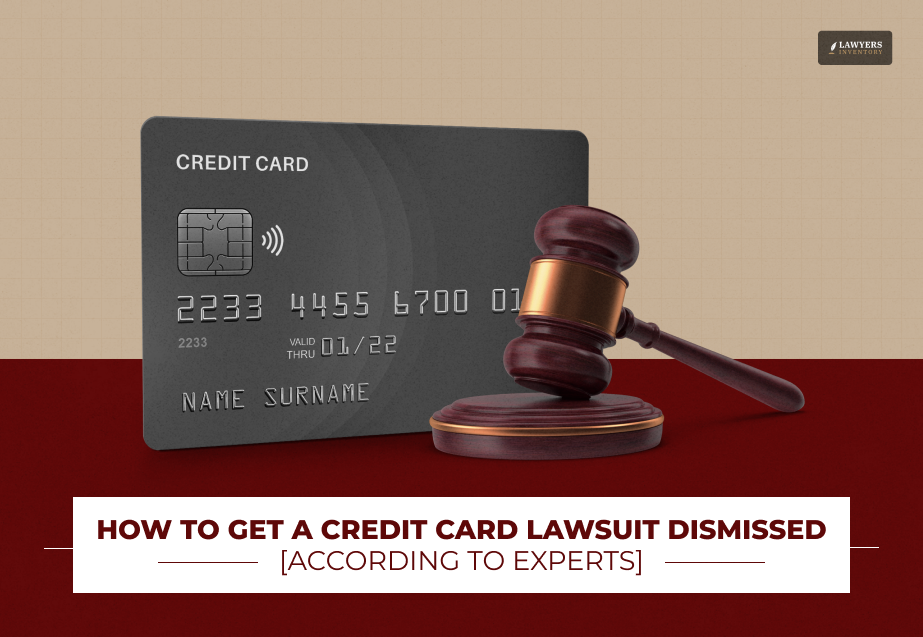
Want to know how to get a credit card lawsuit dismissed? You have come to the right place!
If you’ve been hit with a credit card lawsuit, you’re not alone. In the United States, thousands of people face lawsuits over unpaid credit card debts every year.
In fact, a study by the Consumer Financial Protection Bureau (CFPB) revealed that debt collection lawsuits are one of the most common types of civil court cases in the U.S., where millions of people file annually.
For many, it’s an overwhelming situation that sparks confusion and stress. However, here’s the good news: there are ways to address and even dismiss these lawsuits if you approach them correctly.
Understanding how to get a credit card lawsuit dismissed is the first step in protecting yourself. Whether you’ve fallen behind due to financial hardships or missed payments, knowing your rights and the legal process can make a huge difference.
So, read this blog till the end to learn more and take control of your financial future!
Understanding the Credit Card Lawsuit
Essentially, a credit card company or collection agency is pursuing legal action to recoup unpaid debt when they file a lawsuit against you. This usually occurs following several unsuccessful attempts to collect the money.
Although these cases follow certain procedures, they can be frightening. Additionally, you can react more skillfully if you know what to anticipate.
The creditor or their attorney will typically serve you with legal documents and file a complaint in court.
These records will contain information on the purported debt, including the identity of the creditor, the amount owing, and the reasons they think you owe them money.
You have a short window of time—typically 20 to 30 days, depending on the state—to reply after being served.
Furthermore, failing to respond could result in a default judgment against you, meaning the court automatically sides with the creditor.
But if you take action, you may have the opportunity to challenge the lawsuit, negotiate, or get it dismissed entirely.
Reasons for Getting Sued
Understanding why you’re being sued can help you craft a defense. Common reasons for credit card lawsuits include:
- Missed Payments: If you’ve fallen behind on payments for an extended period, the credit card company may escalate the matter to a lawsuit.
- Debt Sold to a Collection Agency: Sometimes, credit card companies sell unpaid debts to third-party collectors. These agencies are more aggressive in pursuing lawsuits.
- Account Errors: Errors in your account or discrepancies in billing might lead to mistaken lawsuits. It’s crucial to review your records carefully.
- Statute of Limitations Expired: Creditors must sue within a specific timeframe known as the statute of limitations. If they file a lawsuit after this period, you can request dismissal.
Each case is unique, but knowing these reasons can help you identify possible defenses.
Key Documents to Review
To build a strong case—or request dismissal—you need to review the documents related to the lawsuit carefully. Here’s what to focus on:
- The Complaint and Summons: These outline the creditor’s claims against you. Verify that the details, such as the debt amount and creditor’s name, are accurate.
- Your Credit Card Agreement: This document often contains arbitration clauses or terms that can affect how the lawsuit proceeds.
- Payment History: Gather evidence of payments made to the creditor, as errors in payment records can form the basis of your defense.
- Debt Validation Letter: If the debt was sold to a collection agency, request proof that they have the legal right to collect the debt.
- Statute of Limitations Information: Research the statute of limitations for credit card debt in your state to see if the lawsuit is time-barred.
Taking the time to review these documents can help you identify inaccuracies or legal grounds to dismiss the case.
How to Get a Credit Card Lawsuit Dismissed?
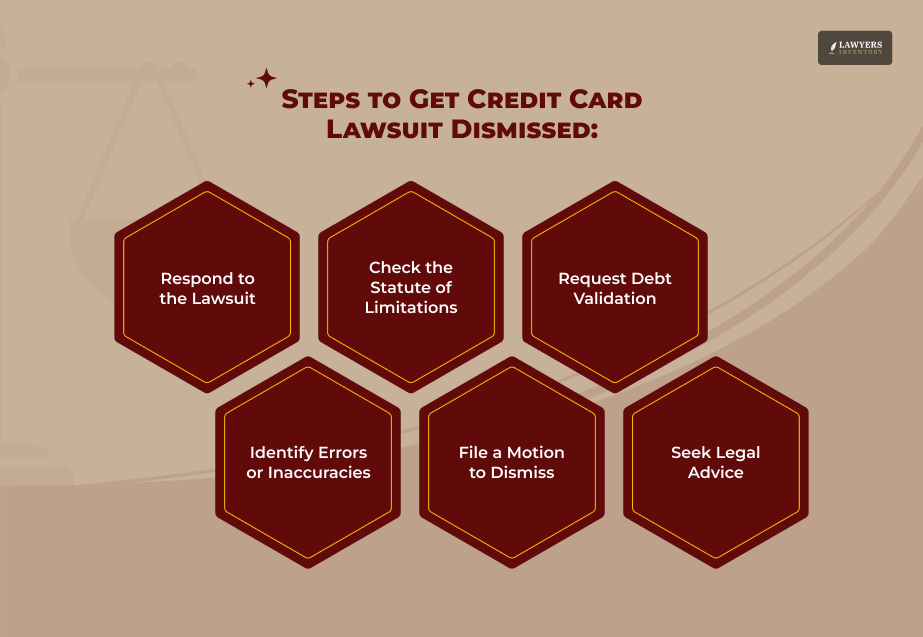
Facing a credit card lawsuit can feel overwhelming, but there are ways to challenge it. Moreover, there’s a high potential for you to dismiss the lawsuit. Additionally, by following these steps, you can take control of the situation and increase your chances of dismissing the lawsuit.
Here’s a step-by-step guide to help you navigate this process:
1. Respond to the Lawsuit
The first step is to respond to the complaint within the timeframe mentioned in the summons, typically 20–30 days. Ignoring the lawsuit will likely result in a default judgment against you. Filing a response shows the court that you are contesting the claim.
2. Check the Statute of Limitations
Secondly, every state has a statute of limitations for credit card debt, usually ranging from 3 to 6 years. If the creditor filed the lawsuit after this period, you can request the court to dismiss it as the debt is time-barred.
3. Request Debt Validation
Third, if a collection agency is suing you, ask for proof that they legally own the debt. This is a debt validation letter. If they can’t provide documentation, the lawsuit may be dismissed.
4. Identify Errors or Inaccuracies
Review the complaint, your payment history, and any agreements. Additionally, look for errors, such as incorrect amounts or accounts. Highlighting these inaccuracies can weaken the plaintiff’s case.
5. File a Motion to Dismiss
If you find a legal issue—like lack of evidence, expired statute of limitations, or improper service—you can file a motion to dismiss. This asks the court to throw out the lawsuit based on these grounds.
6. Seek Legal Advice
Finally, if the process feels confusing or overwhelming, consult an attorney. Legal guidance can help you present a strong defense and explore dismissal options.
Can You Negotiate a Credit Card Lawsuit?
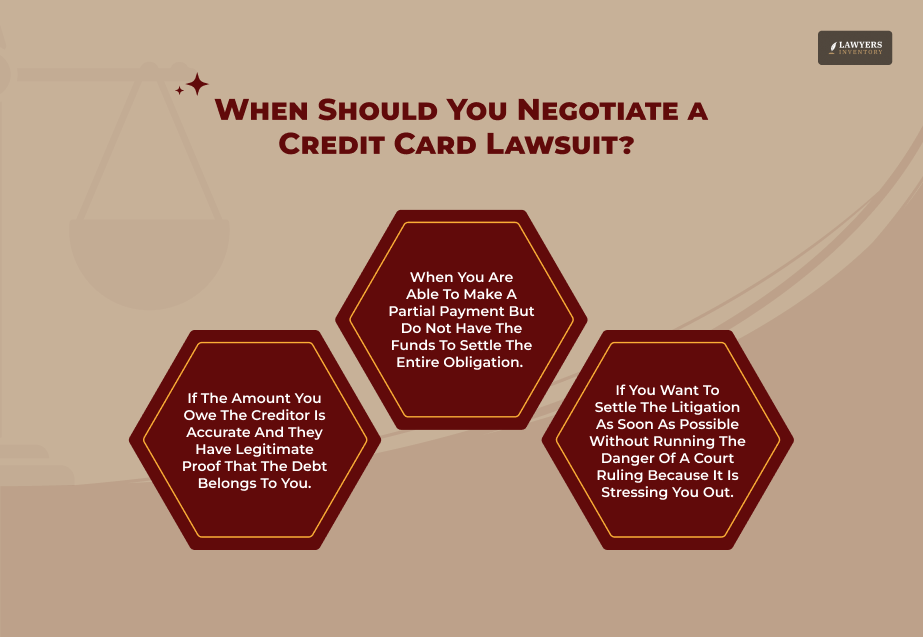
Yes, you can negotiate a credit card lawsuit, and in many cases, it’s a practical option. Negotiating a settlement allows you to avoid prolonged legal battles, reduce the amount you owe, and, most importantly, settle the case on your terms.
While not every lawsuit ends in negotiation, understanding when and how to approach it can work in your favor.
When to Negotiate
First and foremost, it’s critical to understand when it’s appropriate to negotiate. When there is substantial evidence against you or when contesting the debt doesn’t appear likely to succeed, negotiation works best. For instance:
- If the amount you owe the creditor is accurate and they have legitimate proof that the debt belongs to you.
- When you are able to make a partial payment but do not have the funds to settle the entire obligation.
- If you want to settle the litigation as soon as possible without running the danger of a court ruling because it is stressing you out.
Understanding these circumstances enables you to determine whether negotiating is the best course of action.
Crafting a Settlement Plan
Once you decide to negotiate, preparing a clear settlement strategy is essential. Here are steps to create an effective plan:
- Offer a Lump Sum Payment: If you can gather funds, propose a one-time payment for less than the full amount owed. Creditors are often willing to accept a reduced amount if it ensures they receive payment.
- Request a Payment Plan: If a lump sum isn’t feasible, negotiate a structured payment plan. Additionally, this shows good faith and may help you avoid further legal action.
- Include a Dismissal Clause: Ensure the settlement agreement explicitly states that the lawsuit will be dismissed upon payment. This protects you from future claims on the same debt.
It’s always best to get the agreement in writing to avoid misunderstandings.
Debt Validation Requests
Before settling, it’s crucial to confirm that the debt is legitimate. Request a debt validation letter from the plaintiff to ensure:
- They have the legal right to collect the debt.
- The amount they’re claiming is accurate.
If they fail to provide validation, you can challenge the lawsuit or negotiate for a significantly reduced amount.
Legal Assistance and Representation: When to See Help?
Facing a credit card lawsuit can feel intimidating, especially if you’re not familiar with legal procedures.
While you can resolve some cases on your own, there are situations where hiring legal assistance is your best option.
Therefore, knowing when to seek professional help can make a significant difference in your case’s outcome.
When Should You Consider Legal Assistance?
Here are a few situations when experts highly recommend you to reach out to an attorney:
- You Don’t Understand the Legal Process: If you’re confused about legal terms, court deadlines, or how to respond to a lawsuit, a lawyer can guide you. They’ll ensure you file the necessary documents correctly and on time.
- The Debt Amount is Large: When the lawsuit involves a substantial amount of money, it’s worth getting expert advice. An attorney can help you explore defenses, negotiate better settlements, or even help in the dismissal of the case.
- You Believe the Debt is Not Yours: If you’re being sued for a debt you don’t recognize or you suspect identity theft, a lawyer can help you dispute the claim effectively.
- Statute of Limitations is in Question: If you think the lawsuit has a time restraint, an attorney can verify this and file a motion to dismiss based on expired statutes.
- The Plaintiff Has Strong Evidence: When the creditor has documentation that supports their claim, a lawyer can identify any flaws or inconsistencies in the evidence to build a strong defense.
How Can a Lawyer Help?
Hiring an attorney doesn’t just ease your stress—it improves your chances of success. They can:
- Analyze your case and determine the best defense strategy.
- Represent you in court to ensure that the plaintiff’s legal team is not taking advantage of you.
- Negotiate settlements that protect your interests, such as reducing the amount owed or dismissing the case entirely.
If hiring a lawyer seems expensive, look into local legal aid organizations or pro bono services. Many offer free or low-cost assistance for individuals with financial constraints.
By seeking legal help at the right time, you can confidently navigate the lawsuit and potentially achieve a favorable outcome. Don’t hesitate to get the support you need!
Read Also:
- What Does A Debt Relief Lawyer Do? Top 10 Best Debt Relief Lawyers in the US
- Kennedy Funding Lawsuit and the Exploitation of Arkansas Statute of Frauds
- Global Lending Services, Dealerships, Loans, and the Saga of Lawsuits!









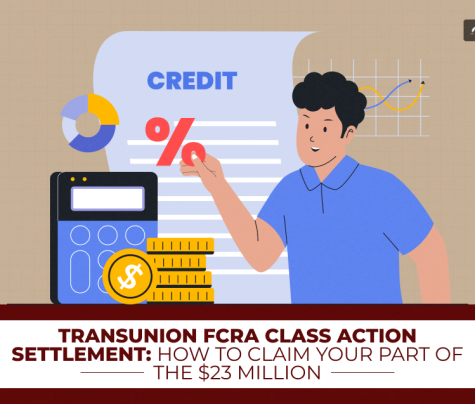
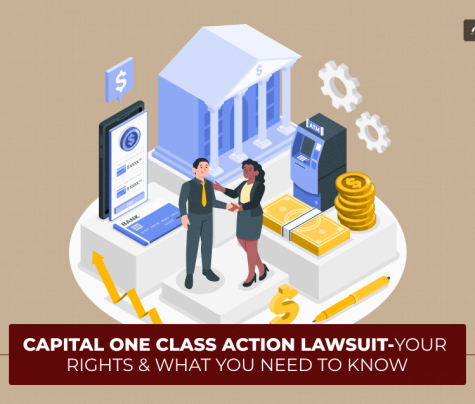
0 Reply
No comments yet.